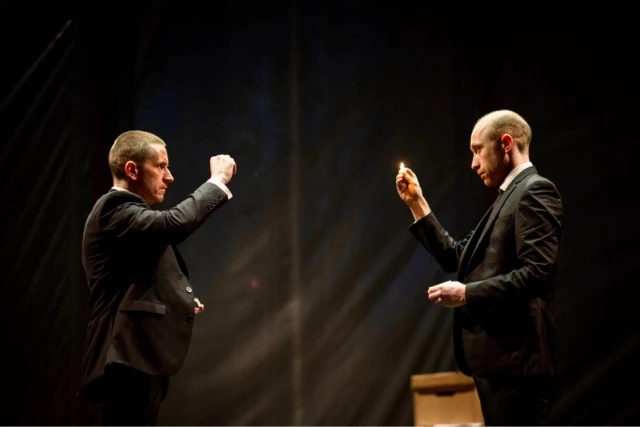Oliver Ryan and Sandy Grierson – photo by Paul Stuart/design by RSC Visual Communications
Antiochus, I thank thee, who hath taught
My frail mortality to know itself,
And by those fearful objects to prepare
This body, like to them, to what I must;
For death remembered should be like a mirror,
Who tells us life’s but breath, to trust it error.
– Shakespeare: Pericles
The cover of the RSC’s programme for
Doctor Faustus (above) shows the two principal actors, Oliver Ryan and Sandy Grierson – either of whom may play the
eponymous rôle on the night (or day), depending on the
whim of a struck match… – gazing at each other, as in a neglected
mirror.
Not only does this image define how
we should
see the two characters of Faustus and Mephistophilis – which we may not otherwise realize until their tragic, heart-piercing
dénouement… – but it
defines the “strange philosophy” (which is neither, in Marlowe’s own words, “odious” nor “obscure”) behind Maria Aberg’s intelligent, entertaining, questioning, and thrilling direction. On a fourth viewing –
finally having made tangible my dream (which might, or not, have involved bartering my soul…) of seeing Sandy Grierson play “Faustus, of Wittenberg, Doctor” (an instructor of
Hamlet, perhaps…?) – this is
so patent, that, with your own nose pressed against the glass, it may actually also be beyond sight.
Good Camillo,
Your chang’d complexions are to me a mirror
Which shows me mine chang’d too; for I must be
A party in this alteration, finding
Myself thus alter’d with’t.
– Shakespeare: The Winter’s Tale
Oliver Ryan and Sandy Grierson – photo by Helen Maybanks/RSC
But these ‘twins’ are no faithful facsimiles. This particular looking-glass is skewed by the actors’ individual interpretations; their own fundamental “dispositions”. They may, in many ways, share one soul: but it has been riven, unevenly, unhappily, in two… – possibly when “God threw [Lucifer] from the face of heaven”. Soon, though, these resultant “Unhappy spirits that fell with Lucifer, And are for ever damned with Lucifer” will be reunited.
Faustus Where are you damned?
Mephistophilis In hell.
Faustus How comes it then that thou art out of hell?
Mephistophilis Why, this is hell, nor am I out of it…
…a fact which we must not forget; a fact which we are never allowed to forget – “tormented with ten thousand hells, In being deprived of everlasting bliss”.
In his fascinating programme note, Conjurors & Collaborators, assistant director Josh Roche writes that…
It’s a bizarre privilege to see two actors’ interpretation of the same character develop in synchronicity. It’s been fascinating to see how clearly each actor has influenced the other, as their ideas were allowed to cross-pollinate. Now that the production is fully completed, I can say one thing with certainty: whoever is playing the Doctor tonight, you can be sure there would be no Faustus without Mephistophilis.
Sandy Grierson (Faustus) – photo by Helen Maybanks/RSC
There are, of course, similarities in their inhabitations of these transposed portrayals. But there are a larger number of disparities – which are subtly amplified by the reactions of the other members of the cast (all of whom give compelling and authoritative performances). The most obvious divergence is the shorter running time (by a good ten minutes) – and yet nothing is lost in that acceleration of pace. Grierson, initially, is a more jovial Faustus; and he addresses the audience directly on many occasions – especially when imploring time to stand still, at the eleventh hour:
O Faustus,
Now hast thou but one bare hour to live,
And then thou must be damned perpetually.
Stand still, you ever-moving spheres of heaven,
That time may cease, and midnight never come!
Fair nature’s eye, rise, rise again, and make
Perpetual day; or let this hour be but
A year, a month, a week, a natural day,
That Faustus may repent and save his soul!
O lente, lente currite noctis equi!
The stars move still; time runs; the clock will strike;
The devil will come, and Faustus must be damned.
We are those “spheres”. It is we who are urged to “rise, rise again” – and I therefore half expected those in the stalls, stage right, to get to their feet: such was the strength of his petition….
And when his climactic pas de deux with “That heavenly Helen which I saw of late” deteriorates into a curdled solo; dissolves to naught; when her “sweet embracings” slacken their hold… – as Ryan gently, beautifully, mesmerizingly in awe and reverence, declaims his fervent astonishment at “the face that launched a thousand ships And burnt the topless towers of Ilium…” – when “Sweet Helen” (the awe-inspiring, affecting Jade Croot), and her long, longing, tender, innocent kiss fails to render Faustus immortal, as he so implores… – then, with his last summoned, regretful gasps of spasmodic, balletic, kinetic energy, he fights to erase the damnable magic he has used; to erase its marks upon the stage; to erase himself…
If we say that we have no sin,
We deceive ourselves, and there is no truth in us.
Why then belike we must sin,
And so consequently die.
Ay, we must die an everlasting death.
What doctrine call you this, Che serà, serà,
What will be, shall be? Divinity, adieu!
…but – “the date is expired: the time will come, and he will fetch me…” – he cannot succeed. What will be, shall be.
Oliver Ryan (Mephistophilis) – photo by Helen Maybanks/RSC
In return for this harrowing, perfectly-crafted crescendo and diminuendo, we get
the most malevolent, mischievous Mephistophilis from Ryan. (He would make a
superb, yet ever so – even
more so – twisted,
Robin Goodfellow!)
Lord, what fools these mortals be!
– Shakespeare: A Midsummer Night’s Dream
Whereas Grierson plays this part with relaxed, laconic, almost
amiable menace, Ryan is edgy, frenetic and manic: almost never still; grinning increasingly as Faustus’ power grows (or, in reality, his willingness to practice it with increasingly odious results). He encourages; he provokes; he manipulates. This is
Jaques’ depraved doppelgänger: delighting in the misfortune of
others, and happy to ignite diabolic mayhem at Faustus’ merest whim.
[Ryan’s happy smile, as he left the stage for the final time – after well-deserved thunderous cheers and applause – was the first time I had not felt threatened by the appearance of those gleaming white fangs as they passed by so close, making his exits and his entrances. Suddenly, as he regained his “proper shape and likeness”, his teeth were inexplicably restored to their human form, and now shone with warm-heartedness; his hectic impishness now full of joy – all devilment leached away instantly – a performer revelling in his unquenchable talent and mastery; unwinding, and yet elated, from the fantastic performance in which he had played such a crucial part.]
Oliver Ryan (Mephistophilis), centre; with company – photo by Helen Maybanks/RSC
…how the music (“a mixture of the seductive and repulsive”) sometimes overwhelmed the speech. Maybe it is my hearing aids’ inability to balance these sounds correctly; but… I do wonder (again) what reasons a director can possibly give for making the actors compete in this way. It certainly does not aid comprehension…!
However, a week or so ago, I had those hearing ‘instruments’ retuned: giving me a greater ability to equalize the ‘live’ level with that available through the Swan’s
induction loop. Not only was the parity of the spoken word and ‘background’ music thus restored – mainly because the sound piped wirelessly to my ears is
mixed by the engineers responsible for the whole production (designed by Claire Windsor) – but I was utterly
immersed in that sinister soundscape: which is definitely “integral to the production”; and which now felt incredibly personal, privileged… almost
private.
O, might I see hell and return again, how happy were I then!
This reanimated resonance therefore
added to the sensation of experiencing the play anew – aided greatly by sitting at the end of the
downstage‑left vomitorium (or ‘
vom’, as designated by the company; and labelled as such by the stage-crew) – which presented a major change of perspective (I had always been stage-right, before); as well as a direct line of sight to the action.
Nothing, Faustus, but to delight thy mind withal
And to show thee what magic can perform.
Watching one of the demon ‘scholars’ leap several feet into the air – and making one hell of a thump on the sprung, wooden floor, immediately in front of me, when landing – reinforced just how much energy every single member of the cast gives to the production: nearly all playing several, very physical, rôles; and therefore involving
fiendishly quick costume changes. This is not a show for the faint-hearted – either in the audience (e.g. the couple who walked out, quite conspicuously, from their central position, as soon as the Seven Deadly Sins appeared… – perhaps
Daily Mail readers…),
or in the ensemble. They really do give their all. Huge lashings of praise are therefore due to each and every one!
Sandy Grierson (Faustus) – photo by Helen Maybanks/RSC
Returning to Grierson and Ryan, I could not choose one performance… – I would not… – over the other. Here are two actors so well-matched (ahem); so comfortable in their concatenation; so very capable… – and it therefore feels an honour to have seen them glory in each other’s light; to bounce off each other’s towering abilities.
As I said in my first review: this “is the very definition of theatre; it is utterly remarkable…” – and I can think of no drama that has so completely meshed with
my emotions; which has had such an intense impact on me that I am delighted that I will be seeing it – four down; three to go…! – seven (yes, seven) times over its long season. (Once more, with captions…!)
And my appointments have in them a need
Greater than shows itself at the first view
To you that know them not.
– Shakespeare: All’s Well That Ends Well



























